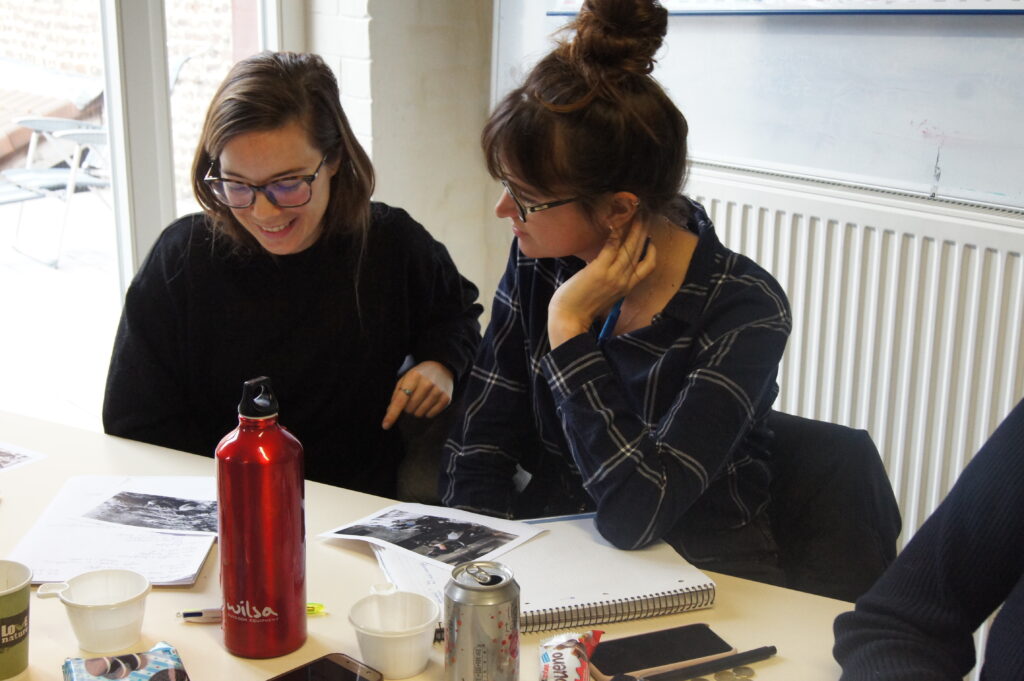Citizen and teacher training is one of our levers of action, so that everyone can take part in the democratic debate. In a tradition of continuing education, these give pride of place to the knowledge of the participants!
Our training courses address to teachers, trainers, actors in the associative world but also to citizens curious to learn more about themes conducive to the development of a more just, united and inclusive society.
Nous proposons régulièrement des formations citoyennes dans nos locaux, mais vous pouvez également moduler certaines de nos formations afin qu’elles conviennent aux besoins de vos groupes !

Dans des modules type ou dans des dispositifs à la carte, Justice & Paix vous propose chaque année plusieurs formations sur ses principaux thèmes d’expertise. Currently, we offer training on six different themes.
Les formations citoyennes et enseignant·es durent en général une journée et sont organisées ponctuellement.
Vous pouvez également adapter ces formations à vos groupes, en choisissant les modules correspondant à vos besoins. Pour cette option, contactez-nous.
Les conflits internationaux sont complexes et, dans le flot d’informations actuel, il est parfois difficile d’en mener une analyse « objective ». Il est pourtant important de s’y intéresser en tant que citoyen·ne, notamment car ils ont des répercussions à différents niveaux de nos sociétés. Cette formation vise à transmettre des clés de lecture pour décrypter les conflits et confronter différents points de vue à leur égard.
The training addresses the issue of conflicts based on geopolitical concepts which are illuminated by current cases, thus allowing better appropriation. Then, it offers tools and approaches for conflict analysis and invites participants to concretely apply these tools and theoretical concepts through the analysis of a specific conflict (Ukraine-Russia, Syria, Korea, South Sudan). South, etc.).
One thing is clear: some countries are full of wealth, but their populations remain poor. The exploitation of natural resources is indeed an important issue which whets the appetite of many local and international players.
Unregulated, it can lead to social (example: Peru) or armed conflicts (example: DR Congo), with serious consequences on the way of life of local populations. However, this wealth, if properly exploited, should make it possible to obtain the economic benefits necessary for the development of a country.
This training traces the journey of precious minerals such as gold or coltan from the mine to… our mobile phone, notably reviewing the many actors involved in this globalized process.
What pushes people to migrate or, on the contrary, holds them back? Where do these people go when they leave their village, their home? What was their life like there, what is their life like here? And how does this affect me in my daily life: by the reception of refugees in Belgium or by the use of minerals that come from these countries?
These questions form the starting point of this training given by Caritas International and Justice & Peace. It aims to offer you the tools to understand the complexity of the migratory phenomenon and more particularly the link, not always obvious, which can exist between natural resources, conflicts and migrations.
The memory of a conflict, recent or not, is crucial to consider the possibility of reconciliation and to enable living together in a society, whether in the country(ies) concerned but also in Belgium where populations sometimes opposed in a conflict have migrated and come into contact with each other.
Memory also plays an essential role in conflict prevention: talking about the past and offering recognition to victims sometimes helps prevent wounds from resurfacing too suddenly. Through examples of memory management of decolonization, the training shows how States choose to talk about the past and for what reasons.
Find these trainings here
This training allows you to better understand the convergence of struggles and the current issues of engagement. It focuses on citizens as full actors in political and economic life by attributing to them a central role.
Emancipation is part of the missions of education. It aims to prepare students to be responsible citizens so that they contribute to a democratic, united, pluralistic society open to other cultures.
Nous organisons régulièrement des formations à destination des citoyens et citoyennes d'une durée d'une journée. Nous alternons entre exposés théoriques, animations et débat afin de laisser la part belle aux savoir des participant·es. Découvrez nos prochaines formations dans notre agenda.
Are you a teacher and want to address social issues with your students? Justice & Peace offers you its expertise in ECMS during teacher training courses organized with the SEGEC/IFEC Or l'IFPC. Abonnez-vous à notre newsletter destinée aux acteur·rices pédagogiques pour vous inscrire aux prochaines formations enseigantes
Vous cherchez une formation sur mesure pour un groupe à propos d'une thématique particulière ? Consultez nos fiches formations, choisissez les modules les plus pertinents en fonction des besoins votre groupe et contactez nous. Les formations " à la carte " peuvent durer entre une demi journée et deux jours. Elles peuvent également être organisées dans nos locaux.
